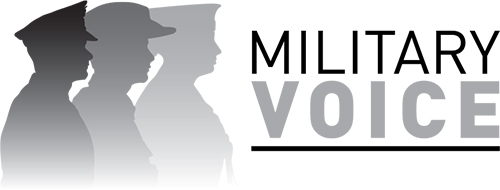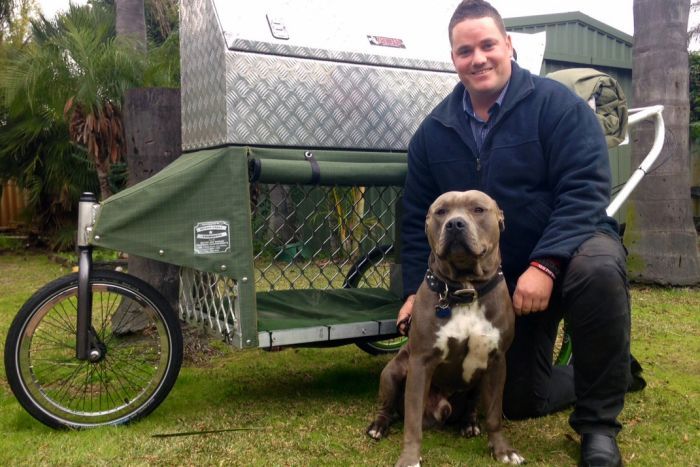Despite walking through desolated wilderness, and having already crossed the Nullarbor once, Hardman won’t be alone this Christmas. He’ll have his faithful companion Trigger at his side. But in houses, farms and campsites across Australia there will be veterans who feel alone and isolated amongst their own friends and families. Hardman and his dog Trigger, a blue American Staffy, will no doubt find comfort in each others company for Christmas. But Hardman is a rare example of a PTSD sufferer who has seized the initiative and talks openly about his illness. So while you’re relaxing this December think of Hardman and Trigger marching across the country. And think also of all those suffering in silence in towns and suburbs across Australia. If you’re reading this article chances are you know someone who’s served.
At Military Voice we come into contact with veterans and service people everyday. We were so inspired by our meeting with Hardman and Trigger at Soldier On’s Canberra HQ that we decided to do something to help Diggers, whether current or ex-service, suffering from PTSD and related mental illnesses. Military Voice is running the “Adopt A Digger” programme this Christmas season to help raise funds for Soldier On. We hope to raise money for the cause, promote awareness in the community and maybe put a smile on the faces of a few Defence kids and collectors along the way.
Christmas can often be the hardest time of the year for veterans, especially those suffering from Post-Traumatic Stress Disorder. The stress of family gatherings can be too much for ordinary Australians. But veterans suffering from mental illnesses like PTSD face unique strains around this time of year. Along with the strain of reaming calm and appearing happy many PTSD sufferers report a sense of loneliness, even amongst loved ones.
Beyond Blue gives the following definition of PTSD “ a particular set of reactions that can develop in people who have been through a traumatic event. That is, they have experienced or witnessed an event which threatened their life or safety, or that of others around them, and led to feelings of intense fear, helplessness or horror. This can be a car or other serious accident, physical or sexual assault, war or torture, or disasters such as bushfires or floods”.
Although between 50 and 80 per cent of the population will experience a trauma in their lifetime severe enough to potentially cause PTSD, not all of them will develop the disorder. It’s estimated that 8 per cent of the population will experience PTSD, many of whom will recover after the first few months following the trauma. PTSD is particularly relevant for the military as service people will be exposed to high stress and trauma over prolonged periods. Royce Hardman, mentioned at the beginning of the article, spent four months in Afghanistan under constant threat. It wasn’t until he arrived home that the enormity of his war experience began to take its toll.
Stereotypes continue to abound in the media and popular culture about the unhinged PTSD sufferer; especially if the PTSD sufferer has a military background. Many of these date to the period after the Vietnam War. Negative associations of veterans with violent mental health disorders had a cultural revival in the 1980’s with renewed success for novels like First Blood (1972), which was turned into the famous first instalment of the Rambo film franchise in 1982. Later Hollywood productions not related to Vietnam, like Full metal Jacket (1987), helped to spread further misconceptions about PTSD sufferers.
Most Diggers suffering from this illness aren’t vocal, violent or homeless. The average Australian service person struggling with this invisible killer seeks to hide the disorder; especially from family or friends. Indeed, what makes PTSD so deadly is not that those diagnosed with what was once called “Shell Shock” are prone to violence. Many feel deflated and hide their growing sense of helplessness until it is too late.
The experience of war changes people, when a soldier returns from a conflict zone they return to normal family life. They often return to a safe and loving home where nothing or little has changed. Many current and ex-service people don’t want to disappoint their families who’ve been worried and waiting eagerly for them to return safe. When the entire family gathers for an extremely happy event like Christmas a veteran suffering from PTSD may not want to ruin the occasion and may seek to hide their often painful feelings from the rest of the family and friendship group.
Hiding an already invisible illness is perhaps the worst thing anyone suffering from a mental disorder as serious as this could do. Worse still are those, particularly older, veterans who don’t have immediate family or support to back them up and are left alone while the rest of the community celebrates Christmas.
Veterans and mental health organisations are ready and willing to help if you know someone who might be suffering from PTSD this Christmas. If you want to know more about Soldier On, or need support, please visit soldieron.org.au/need-help. You can also contact Lifeline on 13 11 14 or Beyond Blue on 1300 22 4636.








Leave Comment